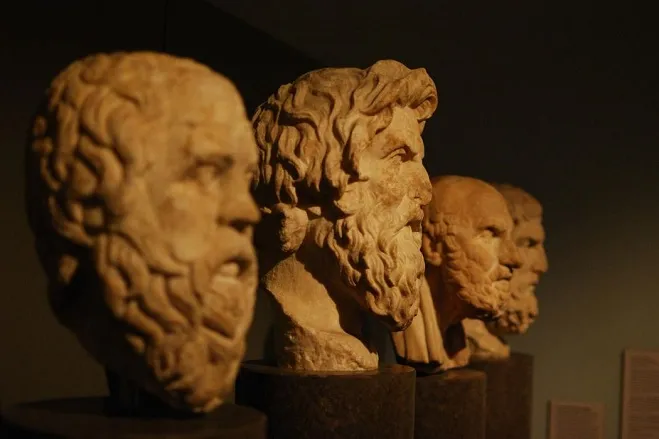In our times in this direction are a number of absurd statements. For example, the philosophizing writer-existentialist Albert Camus believes that the inability to solve the major ontological problems and absurdity in the development of the universe and of mankind also lead to the complete absurdity of the existence of the individual as every human activity is meaningless. Camus has illustrated this concept with the myth of Sisyphus; therefore, according to him, the practical task of philosophy is to solve the problem of suicide.
William James finds that philosophy has as its object the remainder, the sludge of the questions that the science of science as a whole has for some time failed to solve, and therefore philosophy has the task of finding the solution of these most difficult and unsolvable issues and within the limits of its specific connotation-categorical apparatus.
According to Bertrand Russell, the task of philosophy is:
a / give us an analysis to compile a comprehensive picture of the world;
b / give us an analysis of a number of familiar but complexly vague concepts;
c) give a logical analysis of the concepts contained in the subject of other scientific disciplines;
Apparently Bertrand Russell perceives the tasks of philosophy very narrowly and unilaterally, only to the logical analysis of the concepts and categories of scientific knowledge.
Bulgarian philosopher Dimitar Mihalchev / follower of the German philosopher Johannes Remke / very successfully summarizes the extremely versatile character of the tasks that are placed before philosophical science. It reduces them to the following three questions:
1.Which is the world as a whole, what is its basis of life and what is its essence?
- What is the knowledge of the world?
- What is the meaning of the world and of human life?
The common task of these problems is to define and explain the world as a whole and the attitude of man to God-the Originator of everything, creation and the human community.
HISTORICAL FORMS OF RELATIONSHIP BETWEEN PHILOSOPHY AND PRIVATE SCIENCES
The mutual conditioning and the relative volume coincidence between philosophy and the private sciences has changed since the day of their emergence. Wilhelm Vindelband's opinion is very widespread in philosophical science, according to which philosophy at its very beginning contained all the sciences in its own right. The Greeks have known the unified and integral science, from which the separate special private sciences gradually broke. Ancient philosophy is not divided into separate branches. It carries a common, general philosophical character: all branches of knowledge have been under the aegis of philosophy and have been subordinate to (siencia universalia). Initially, philosophy - like a love of wisdom - was used to denote any kind of knowledge. Plato understood under philosophy "science at all". In this sense, in his dialogue Teet, he also calls the geometry "philosophy". Aristotle, who makes the first classification of science in antiquity, maintains that philosophy - this is the so-called "first physics" - for the moody and unchangeable beginnings of the existing.
